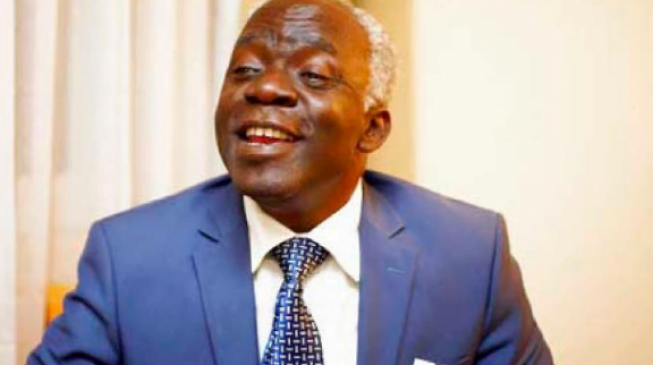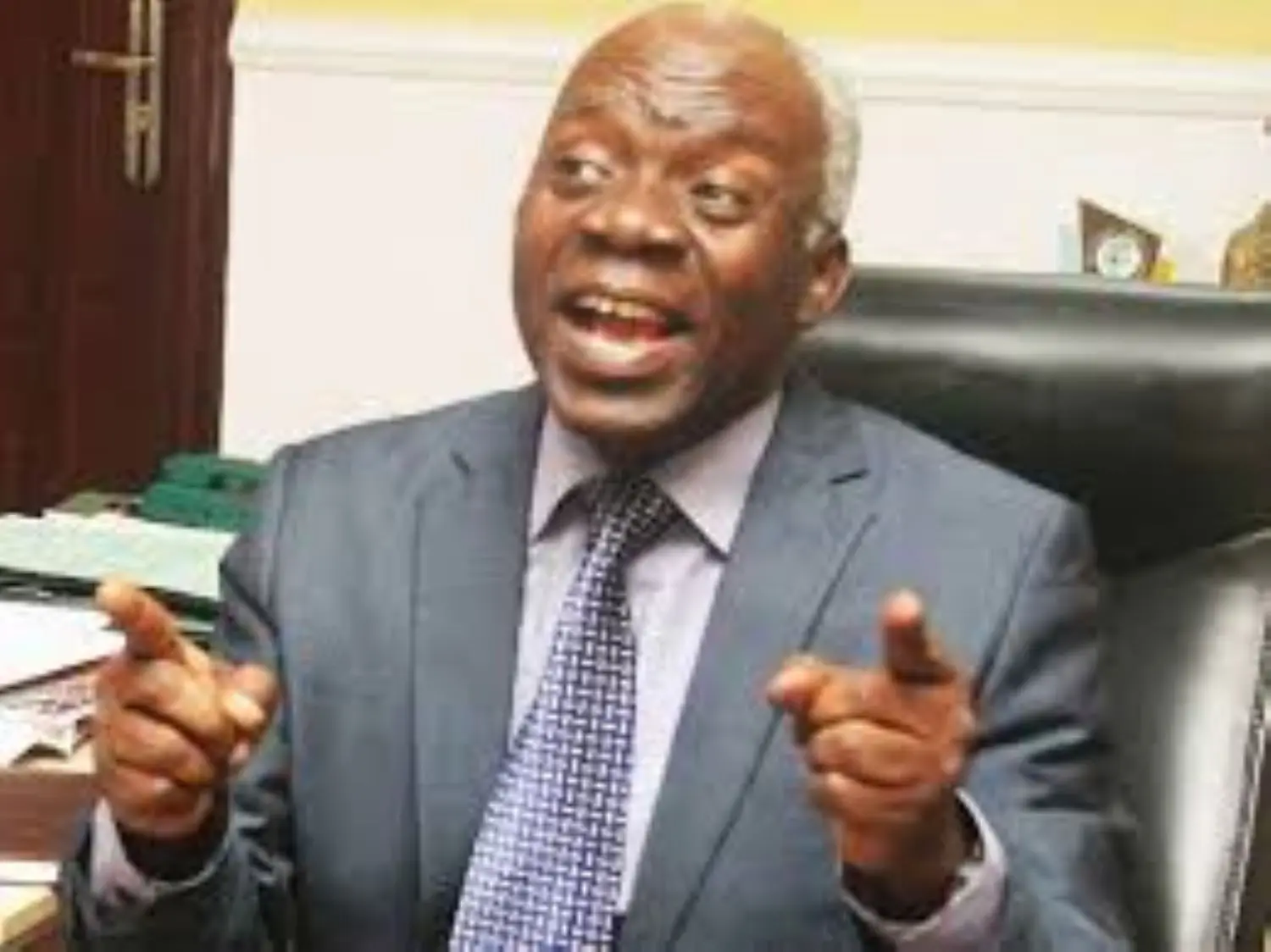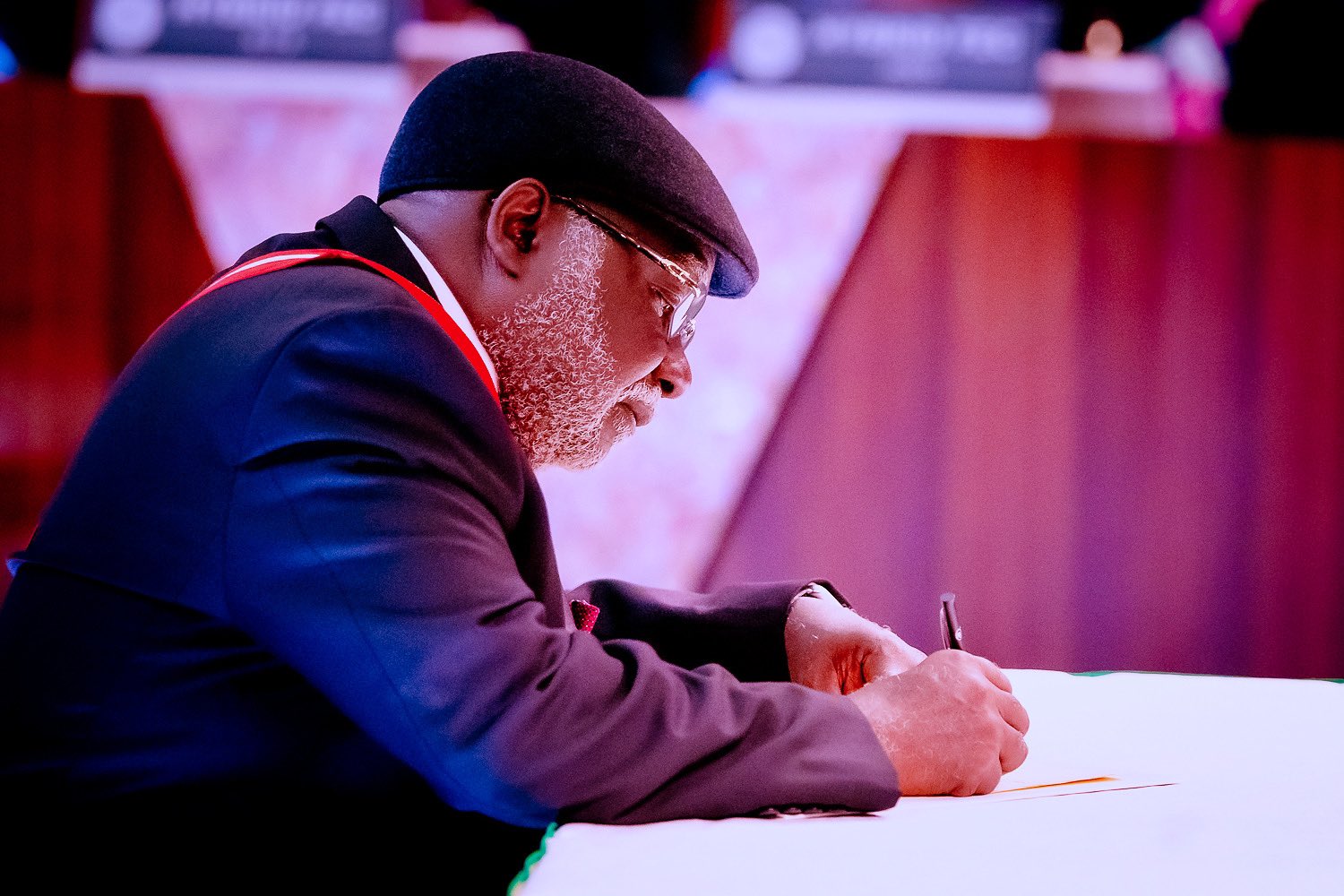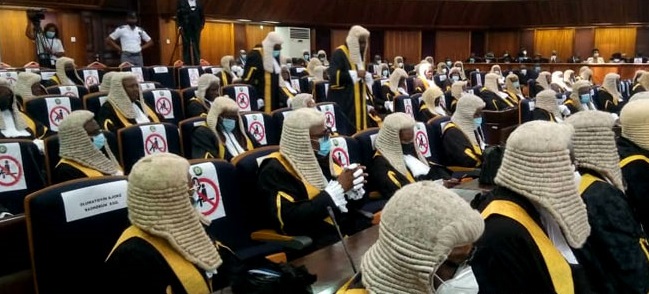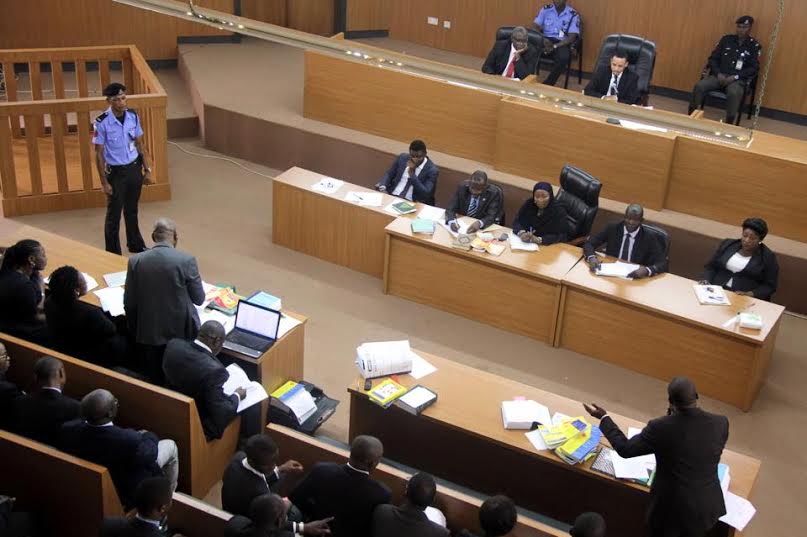Interestingly, the case of FRN V Omatseye was a criminal prosecution in respect of which the EFCC itself had briefed Obla and provided the proof of evidence, witnesses and other information utilized by Oblain the course of the trial.
This trial commenced in February 2011 before Justice Binta Nyako until 2013 when Obla filed an amended Charge and the Defendant was consequently rearraigned before Justice Ajumogobia.
The entire trial spanned the course of 5 years i.e. between the first arraignment in 2011 and 20 May 2016 whenthe judgment convicting the Defendant for sundry breaches of the Public Procurement Act was delivered.
In this 5 -year period, Obla appeared before the Court on at least 46 occasions along with junior Counsel on behalf on the EFCC.
It is on record that Omatseye’s conviction was very significant in the fight against corruption and was widely celebrated as the first conviction ever secured by the EFCC for breach of contract approval thresholds under the Public Procurement Act.
One factor which lends credence to this assertion was the wide celebration by the EFCC of this conviction/Judgment. For instance, the EFCC in its Press Release dated 20th May 2016(which continues to appear on its website
www.efccnigeria.org)
had the following to say about the Judgment:
“After five years of grueling legal battle, justice is finally served as a Federal High Court sitting in Lagos today convicted a former Director General of the Nigeria Maritime Administration and Safety Agency, NIMASA, Mr. TemisanOmatseye.
Justice Rita Ofili- Ajumogobia in a landmark ruling convicted the former DG on 25 of the 27-count charge bordering on alleged contract variation, bid rigging and awarding contract above his approval limit which violates the provisions of the Public Procurement Act, brought against him by the Economic and Financial Crimes Commission, EFCC.”
Again, on May 27 2016, the Acting Chairman of the EFCC, whilst speaking at the launch of the “Clean Hands Against Corruption Campaign” at the Eagle Square in Abuja alluded to the conviction of Raymond Omatseye as one of the “140 convictions the Economic and Financial Crimes Commission (EFCC) has secured in six months.”
It is perhaps curious that the same EFCC which lauded the conviction of Raymond Omatseye at several fora, made a complete volte-face to allege that the conviction was secured as a result of “perversion of justice”, moresoas no indication has been given as to whatever motivation Obla might have had to pay a bribe to secure a conviction on a case investigated by the EFCC and for which the EFCC itself provided the witnesses and proof of evidence. By alleging that Obla attempted to “pervert the course of justice” in the case of FEDERAL REPUBLIC OF NIGERIA v. OMATSEYE, one wonders whether the EFCC was contending that the accused person in that case- who was investigated by the EFCC itself, ought not to have been tried at all, much less convicted and instead ought to have been discharged and acquitted.
In addition to the Omatseye trial,at several times between 2008 and 2015, Obla was engaged by the EFCC to prosecute and/or defend a number of cases at various courts against persons alleged to have been involved in economic and financial crimes or in respect of which the EFCC had been sued.
By virtue of the various instructions of the EFCC to Obla for these various cases, Obla led the prosecution of over 40 cases and spearheaded the recovery of various properties and assets (including cash and shares in Banks and other companies) for the benefit of the EFCC and the Federal Government of Nigeria. All of these forfeited properties/monies were duly handed over to the EFCC.
Despite these sterling achievements as a prosecutor, the EFCC consistently failed to pay Obla’s professional fees and to reimburse him for out-of-pocket expenses incurred by him in the course of representing the EFCC in all those cases. All demands by Obla for payment of the said fees and expenses as well as all the reminders issued in their regard were ignored by the EFCC.
Despite the EFCC’s treatment of Obla’s request for fees, to ensure the unimpeded prosecution of these cases, many of which were at crucial and delicate stages of trial, Obla, on behalf and with the full knowledge of the EFCC, continued to incur out-of-pocket expenses to cover filing fees, transport costs for himself and junior colleagues (including flight tickets to attend matters outside jurisdiction), clerical and secretarial costs, accommodation, telephone services, appearances costs etc., all of which culminated in several judgments/rulings/orders in favour of the EFCC and the forfeiture of significant assets and properties (real and monetary).
Notwithstandingits persistent failure to pay Obla’s fees, the EFCC, by a letter dated 14thMarch 2016 purported to disengage Obla from providing legal services to the Commission. In response to the EFCC’s letter, Obla wrote a letter to the EFCC dated14th April 2016 by which he issued a reminder on the long overdue fees and expenses owed to him. It was in the course of this exchange on the issue of fees that the EFCC, perhaps motivated by a desire to avoid the payment of its debts to Obla, filed a criminal charge against Obla and Justice Ajumogobia before the High Court of Lagos State in SUIT NO: LD/3671C/16, alleging that Obla bribed Justice Ajumogobia to ‘procure’ the conviction ofOmatseye in the EFCC case of FRN V OMATSEYE (Charge No.: FHC/L/C/482C/1.
Obla has since filed a suit against the EFCC before the High Court of the Federal Capital Territory in Suit No: CV/3220/17 claimingthe sum of N 685,389,928.10 (Six Hundred and Eighty-Five Million, Three Hundred and Eighty-Nine Thousand, Nine Hundred and Twenty-Eight Naira and 10 Kobo) and $ 202,460.47 (Two Hundred and Two Thousand, Four Hundred and Sixty Dollars and Forty-Seven Cents) as fees and expenses owed to him by the EFCC.
This suit was initially before the Justice Valentine Ashi(of blessed memory), and in the course of the trial the parties had led their evidence and filed their final addresses.
It was while waiting for a date for the adoption of the respective final addresses that news filtered in of the unfortunate demise of the presiding Judge.
The case has recently started de novo before the Justice Adeniyi of the High Court of the FCT.
On 28 November 2016, Justice Rita Ofili-Ajumogobia and Godwin Obla (SAN) were arraigned before Justice Hakeem Oshodi of the Lagos State High Court, Ikejaon a 30-count Information dated November 17, 2016- Suit No: LD/3671C/16.The Information was subsequently substituted with a 31-Count Amended Information dated21st February 2018.
Obla was only affected by Counts 1-4 of the information where he was charged with the following:
Conspiracy to pervert the course of justice contrary to section 97(1) of the Criminal Law of Lagos State, No. 11, 2011.
That you HON. JUSTICE RITA NGOZI OFILI AJUMOGOBIA AND GODWIN OBLA (SAN) on or about the 21st day of May, 2015 in Lagos within the jurisdiction of this Honourable Court, conspired with one another to pervert the course of justice in Charge No. FHC/L/C/482C/10 with the sum of N 5,000,000.00 (Five Million Naira).
Attempt to pervert the course of justice contrary to section 97 (1) of the Criminal Law of Lagos State, No. 11, 2011
That you HON. JUSTICE RITA NGOZI OFILI AJUMOGOBIA AND GODWIN OBLA (SAN) on or about the 21st of May 2015 in Lagos within the jurisdiction of this Honourable Court, attempted to pervert the course of justice in Charge No. FHC/L/C/482C/10 with the sum of N 5,000,000.00 (Five Million Naira)
Offering gratification to a public official contrary to section 64 (1) of the Criminal Law of Lagos State, No. 11, 2011
That you GODWIN OBLA (SAN) on or about the 21st day of May, 2015 in Lagos within the jurisdiction of this Honourable Court intentionally gave the sum of N 5,000,000.00 (Five Million Naira only) to Hon. Justice RITA NGOZI OFILI AJUMOGOBIA of the Federal High Court directly from your Obla and Company’s account No. 1015319084 domiciled in the United Bank for Africa Plc, in order that the said Judge acts in the exercise of her official duties.
Offering gratification to a public official contrary to section 64 (1) of the Criminal Law of Lagos State, No. 11, 2011.
That you GODWIN OBLA (SAN) on or about the 21st day of May, 2015 in Lagos within the jurisdiction of this Honourable Court, intentionally gave the sum of N 5,000,000.00 (Five Million Naira only) to Hon. Justice RITA NGOZI OFILI AJUMOGOBIA of the Federal High Court directly from your Obla and Company’s account No. 1015319084 domiciled in the United Bank for Africa Plc, in order that the said Judge refrains from acting in the exercise of her official duties.”
The trial before the Lagos State High Court spanned more than two (2) years and came up on more than 22 separate dates between28th November 2018 and 16th April 2019 as follows: 28thNovember 2016, 8thDecember 2016, 9thJanuary 2017, 30thJanuary 2017,10thMarch 2017, 17thMarch 2017, 28th April 2017, 26thMay 2017, 1stJune 2017, 6thJuly 2018, 29thSeptember 2017, 10thNovember 2017, 26thJanuary 2018, 23rdFebruary 2018, 23rdMarch 2018, 20thApril 2018, 25thMay 2018, 8thJune 2018, 14thSeptember 2018, 2ndNovember 2018, 14thDecember 2018, 25thJanuary 2019 and 16thApril 2019.
At the Lagos High Court, the EFCC called 14 witnesses and eventually closed its case on14th September 2018.
In the course of its presentation of its case, the EFCC demonstrated that whereas the Charge against Obla was for the payment of N 5 millionfrom his UBA Account, allegedly to Justice Ajumogobia to pervert the course of justice, the evidence before the Court was that no payment was made by Obla into any of her personal accounts. Instead, the payment of the N 5 million in contention was to a registered company – Nigel &Colive Ltd- whose directors did not include Ajumogobia.
Other elements of the EFCC’s case included that no petition was filed against Obla alleging any wrongdoing on Obla’s part in connection with the Omatseye case; that the EFCC did not investigate Obla’s defence that the payment of the amount in question was for the purpose of obtaining building materials for his construction site; that the EFCC defended the Omatseye Judgment and vigorously resisted the Appeal against his conviction; and that the EFCC’s conclusion that Obla paid a bribe was essentially not predicated on any hard facts.
Obla immediately responded to the closure of the prosecution’s case by filing a no case submission on the same date (14thSeptember 2018), seeking an order of acquittal on the ground that the prosecution had not made out a sufficient case to warrant a defence.
Notwithstanding the weighty submissions made in Obla’s no case submission, the EFCC never filed any reaction to it before the Court.
After Obla filed his no case submission and the EFCC failed/refused to file any response, Justice Ajumogobiafiled a motion challenging the jurisdiction of the Court on the ground that, being a judicial officer and by virtue of the judgment of the Court of Appeal in the case of NGANJIWA V FRN(delivered on 11th December 2017), the charge against her could not have been filed until after disciplinary action by the National Judicial Council had been taken against her. Surprisingly, the EFCC Counsel, Rotimi Oyedepo, who had conveniently failed to respond to Obla’s no case submission, immediately filed a counter affidavit conceding to Justice Ajumogobia’s objection and in fact urged the court to strike out the charge and discharge both Obla and Ajumogobia.
Obla’s Counsel (Chief I.A. Adedipe, SAN andChief F.O. Orbih, SAN)both argued that considering the stage of the proceedings, the EFCC’s failure/refusal to file any response to Obla’s no case submission ought to be interpreted as a concession to the fact that Obla was entitled to an order discharging and acquitting him on all the counts of the Amended Information related to him.
The Judge however opined that since the jurisdiction of the Court had been challenged, the only issue to consider was whether or not the Court had the jurisdiction to continue with the trial.
Consequently, after more than two years of trial, Justice H. Oshodi on 16th April 2019delivered a ruling striking out the charge before the Lagos High Court. The Court held that based on the judicial precedent set by the case of Nganjiwa V. FRN, the High Court lacked jurisdiction to hear the suit, as the EFCC “jumped the gun” in filing the Amended Information.
The Court, in its Ruling, seriously deprecated the conduct of both the EFCC and its Counsel, Rotimi Oyedepo and condemned its prosecution of the case in the following words:
“Before concluding, the Court will want to make one or two comments.
As noted above, the Prosecution, as at Monday 11th December 2017 was aware, as a result of the decision of the Court of Appeal in HON. JUSTICE HYELADZIRA NGANJIWA V FEDERAL REPUBLIC OF NIGERIA (Supra) that the Court lacked jurisdiction to entertain the criminal action filed against the 1stDefendant. As at that day, the 1stAmended Information was yet to be filed. As at that day, the 12th (twelfth) witness for the Prosecution was still giving evidence. One would have thought that the Prosecution would have urged the Court to strike out the case as a consequence of the decision of the Court of Appeal. But no! the Prosecution still persisted, like a bull running amok, amended the Information and called 2 (two) further witnesses.
It ought to be pointed out for record purpose that a counsel is a minister in the temple of justice and as an officer of the Court, a counsel has a duty to assist the Court rather than mislead it. In other climes, where learned counsel that find themselves in such a position, as an officer of the court, will have brought a proper application to have the case abated. Why the Prosecution went on with proceedings when it is obvious that all what the Court was doing amounted to a nullity is best known to them. Precious judicial time had been wasted. Though the Court is aware of the provision of Section 285 (1) of the Administration of Criminal Justice Law 2015, which is against a Private Prosecutor, it is so unfortunate that in our judicial system, we have still not devised ways and means to condemn a Prosecuting Agency of the Government, be it State or Federal, in a criminal action by the payment of heavy cost in situations as this instance, having in mind that a Defendant will have incurred cost in defending the charge, albeit a worthless charge.
It has to be restated that there is no doubt that a counsel is duty bound to present his clients’ case with utmost devotion. But such devotion must be coloured with professional discretion. In other words, counsel must be the master in the conduct of his client’s case and should not be dictated to by his client as to how to conduct the case. It is in recognition of that authority of counsel that Rules 14(c) and 18(a) of the Rules of Professional Conduct, published as Government Notice No. 69 in Federal Official Gazette No. 5 of 18th January 1980 which deals with how far a lawyer may go in supporting a client’s case and the right of the lawyer to control the incidents of the trial, makes it a provision of a law.
No fear of judicial disfavour of public unpopularity should restrain counsel from the full discharge of his duty. In the judicial forum the client is entitled to expect his lawyer to assert every such remedy or defence. It must however be borne in mind that the great trust of the lawyer is to be performed within and not without the bounds of the law…”
The ruling of the Lagos State High Court and the comments of the trial Judge raisea few interesting issues.
For instance, why did the prosecution deliberately refuse to notify the Lagos State High Court that the Court lacked jurisdiction as soon as it became aware of that fact? This is even more curious when it is considered that the EFCC was a party to the NGANJIWA case and that it was in fact the same prosecutor (Rotimi Oyedepo) that appeared for the Federal Republic of Nigeria in that case that prosecuted the case against Obla and Ajumogobia at the Lagos State High Court. Again, it is worth asking what the prosecution intended to achieve by calling more witnesses in the trial even after becoming aware that by the decision inNGANJIWA’S case the Court lacked the jurisdiction to try the case, only to subsequently concede to the court’s lack of jurisdiction several months after at the time it did.
It would seem from the observations made by Justice Oshodi J. in his ruling, that the prosecution’s desire to proceed with a trial even when it was apparent that the court lacked jurisdiction smacked of an intent to persecute the defendants, and not to prosecute them within the bounds of the law.
On 16th April 2019- the same date the Lagos High Court delivered its judgment striking out the Information against Obla and Ajumogobia- Obla filed a notice of appeal (APPEAL NO: CA/LAG/CR/517/2019)challenging the decision of the Court to merely strike out the Information without acquitting him. This Notice of Appeal was subsequently replaced by one filed on 30thApril 2019.
This Appeal mainly seeks an Order of the Court of Appeal discharging and acquitting Obla on the relevant counts of the Information filed at the High Court of Lagos State, having regard to the EFCC’s failure to respond to his no case submission and its concession to the lack of jurisdiction at that stage. The prayers sought in the Appeal (which is currently before the Court of Appeal, Lagos Division) are as follows:
a. “AN ORDER of the Court of Appeal allowing this appeal and setting aside the decision/Ruling of the High Court of Justice of Lagos State delivered on 16 April 2019.
b. AN ORDER of the Court of Appealinvoking its jurisdiction under Section 15 of the Court of Appeal Act Cap. C36 LFN 2004 by assuming jurisdiction over the Appellant’s Application made on 25 January 2019and granting an order permitting the separate trial of the Appellant on Counts 1, 2, 3 and 4 of the 1st Amended Information dated 21 February 2018.
AND/OR ALTERNATIVELY
c. AN ORDER of the Court of Appeal invoking its jurisdiction under Section 15 of the Court of Appeal Cap. C36 LFN 2004to hear and determine the Appellant’s no case submission dated14 September 2018.
d. A CONSEQUENTIAL ORDERdischarging and acquitting the Appellant on Counts 1, 2, 3 and 4 as contained in the 1st Amended Information dated 21st February 2018.”
Obla’sAppellant’S Brief was filed on 8 May 2019 and it was served on the EFCC on the same day. Following the EFCC’s failure to file its Brief, Obla’s Counsel filed a Notice of Motion dated 8November 2019 (Motion No: CA/LAG/ROA/CA/128/M/2019) seeking an Order setting the Appeal down for hearing on the Appellant’s Brief alone. The Court of Appeal then fixed 17 October 2019 to hear the said application.
On 16 October 2019, just one day before the date fixed for the hearing of the motion, the EFCCfinally filed its Brief of Argument along with an application to regularize its position in the Appeal.Obla immediately filed his Reply Brief on 17 October 2019 and on the said date withdrew the application dated 8 November 2019.
The Appeal has now been fixed for hearing on 28th May 2020.
On 17th April 2019 – a day after the ruling of the Lagos State High Court striking out the charge and discharging the defendants- the EFCC re-arraigned the defendants before Justice R. Aikawa of the Federal High Court on an 18-count Charge bordering on conspiracy, unlawful enrichment, and money laundering- Charge No: FHC/139C/19.
A review of this fresh Charge shows thatCounts 1,2 and 3which affect Obla personally are predicated on the same facts and elements as Counts 1,2,3 and 4 of the Information struck out by the Lagos High Court (SUIT NO: LD/3671C/16).
In effect therefore, the filing of this fresh Charge at the Federal High Court on the same facts and evidence as the Information previously struck out by the Lagos High Court (and which is the basis of Obla’s pending appeal) appeared to be an abuse of Court process.
In line with the above, Obla filed an application at the Federal High Court to quash the charge for being an abuse of Court process and a constructive attempt to render Obla’s pending appeal nugatory.
The motion also sought an alternativeorder permitting the separate trial of the Defendants. This Application was predicated on the following points:
That the charge filed at the Federal High Court is:
a. On the same set of facts and in relation to the same transaction which were/was the subject of the prosecution at the Lagos State High Court.
b. Against the same Defendants as with the case at the Lagos High Court
c. Founded on the same proof of evidence and witnesses as with the prosecution at the Lagos High Court.
d. Prejudicial to the appeal filed by Obla and is obviously intended to overreach him in the prosecution of the said appeal.
On 28th June 2019 Justice R. Aikawa of the Federal High Court, Lagos Division delivered a Ruling dismissing this application. Curiously, for more than three months after the delivery of this ruling, despite numerous and sustained attempts to obtain a copy of the ruling, Obla was unable to obtain a copy of this Ruling for the purpose of appealing against it until 15thOctober 2019.
The eventual release of the copy of the Ruling bearing the text of the Judge’s Ruling followed after a ruling without any text was initially handed over to Obla’s lawyers. This blank ruling was thereafter retrieved and replaced with the correct ruling in circumstances that seemed to suggest that the ruling was either not written initially or was deliberately withheld from Obla in order to frustrate his appeal.
Owing to the circumstances surrounding the non-release (and eventual release) of this ruling on Obla’s application and the general state of the matter, Obla’s lawyers wrote to the Chief Judge of the Federal High Court asking for the Charge to be reassigned to another Judge of the Federal High Courton the ground that Obla may not obtain a fair trial under the Judge presentlyseisedof the matter (i.e. Hon. Justice R.M. Aikawa).
The case at the Federal High Court is currently awaiting the decision of the Chief Judge of the Federal High Court as to whether the Charge should be reassigned to another Judge of the Federal High Court or not. In the meantime, the case has been adjourned to April 29th 2020.
Obla’s travails at the hand of the EFCC- an organization he served as a frontline prosecutor for over five years may not be unconnected with what appears to be a persecution agenda harboured by some elements within the Commission.
The circumstances of his case appear to lend credence to this perspective. Obla, for the five years he was prosecuting for the EFCC, consistently championed the prosecution of several corruption-related cases for the EFCC and obtaining the forfeiture of cash and assets worth several billions of Naira.
However, as soon as a new leadership was appointed to head the anti-graft commission, the table seemingly turned, and he became the hunted.
First, he was invited on several occasions over his perceived role in the Halliburton case- for which he was appointed by the former Attorney General Federation and Minister of Justice, Mohammed Bello Adoke, as part of the legal team which negotiate the plea bargain agreements with the companies involved in the scandal, which culminated in the recovery of the unprecedented sum of $200million for the Federal Government of Nigeria.
Thereafter the EFCC has filed criminal charges at the Lagos State High Court and the Federal High Court respectively alleging that he paid a bribe for a case handled on EFCC’s behalf.
Obla’s travails may not also be unconnected with his suit against the EFCC seeking the recovery of his professional fees to the tune of overN 685,389,928.10 (Six Hundred and Eighty-Five Million, Three Hundred and Eighty-Nine Thousand, Nine Hundred and Twenty-Eight Naira and 10 Kobo).
It is a mystery that after years of meritorious service to the EFCC in various capacities, particularly as prosecutor in no less than 40 cases involving economic and financial crimes- leading to various convictions and the forfeiture of various assets, the EFCC has chosen to treat him with disdain. It remains to be seen whether the pendulum of justice will eventually swing in Obla’s favour.


